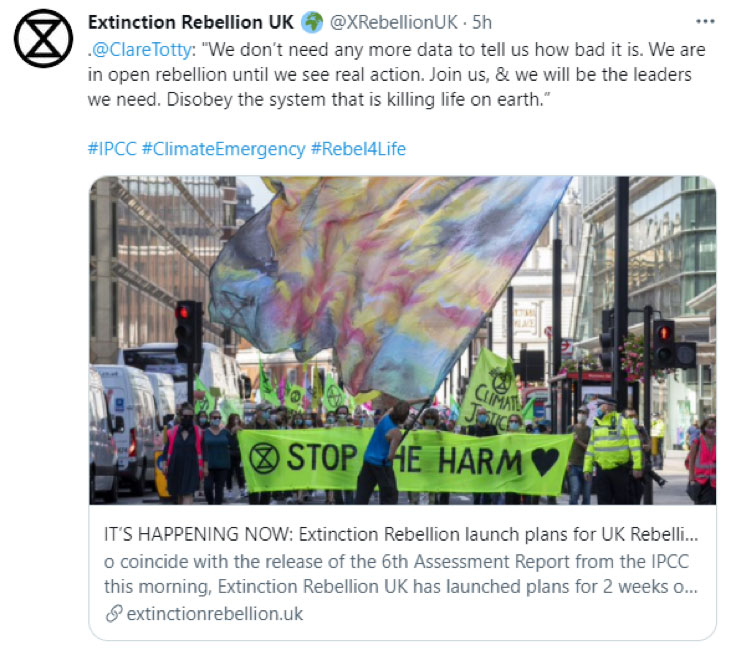On August 9, 2021, the Intergovernmental Panel on Climate Change (IPCC), released the first in a series of assessments on climate change. It is the world’s largest, most comprehensive (over 14,000 scientific papers reviewed), and up-to-date assessment of the impact of human activity on climate.
- It is unequivocal that human influence has warmed the atmosphere, ocean and land. Widespread and rapid changes in the atmosphere, ocean, cryosphere and biosphere have occurred.
- Human-induced climate change is already affecting many weather and climate extremes in every region across the globe. Evidence of observed changes in extremes such as heatwaves, heavy precipitation, droughts, and tropical cyclones, and, in particular, their attribution to human influence, has strengthened since the Fifth Assessment Report (AR5) carried out in 2013.
- Global surface temperature will continue to increase until at least the mid-century. Global warming of 1.5°C and 2°C will be exceeded during the 21st century unless deep reductions in carbon dioxide (CO2) and other greenhouse gas emissions occur in the coming decades.
- Many changes in the climate system become larger in direct relation to increasing global warming. They include increases in the frequency and intensity of hot extremes, marine heatwaves, and heavy precipitation, agricultural and ecological droughts in some regions, and proportion of intense tropical cyclones, as well as reductions in Arctic Sea ice, snow cover and permafrost.
- Many changes due to past and future greenhouse gas emissions are irreversible for centuries to millennia, especially changes in the ocean, ice sheets and global sea level.
- Limiting human-induced global warming to a specific level requires decreasing cumulative Carbon Dioxide (CO2) emissions, reaching at least net zero CO2 emissions, along with strong reductions in other greenhouse gas emissions. Strong, rapid and sustained reductions in Methane (CH4) emissions would also limit the warming effect resulting from declining aerosol pollution and would improve air quality.
The report will form the basis of the UN COP26 climate summit, which will take place in the UK in November. The summit will involve 196 countries that will try to agree a way forward on how to deal with climate change.
The IPCC report will be closely scrutinized by a wide range of actors. Its stark findings are likely to drive anger and frustration amongst climate activists leading to climate-related protests by groups such as Greenpeace, Friends of the Earth, and Extinction Rebellion (XR). Protests are very likely to increase in the UK and other countries in the lead up to and during the COP26 summit in November.
XR has previously directly targeted oil and gas companies and financial institutions that invest in fossil fuels, as well as carried out more general protests in major metropolitan areas that have blocked roads and disrupted public transport and air-travel. Greenpeace and Friends of the Earth also regularly carry out direct action against organizations they accuse of damaging the environment. In 2019, Greenpeace activists occupied a platform of a BP oil rig and in 2018 staged a protest at French oil company, Total’s, annual shareholders’ meeting in Paris, France. The activity of these groups is typically designed to cause disruption and embarrassment for the target and gain publicity for environmental causes rather than cause damage to property.

Nevertheless, climate-related protests do occasionally become violent. In February 2020, a climate change protest outside the Paris headquarters of investment firm BlackRock was joined by anti-capitalist and anti-government activists. Protesters waving anarchist flags, as well as ones denoting ecological groups such as XR forced entry into the BlackRock office, damaged property, and spray painted the walls and carpets with environmental and anarchist slogans.
Primary targets for this type of activity are likely to be companies in the oil and gas and other extractive industries, energy heavy industry and technology and financial organizations that invest in or work with these sectors.
There will also be an even greater scrutiny of company policies towards climate change not just from activist groups but from clients, customers, and employees. This will carry reputational risks for organizations not meeting their commitments or those identified as not having any climate commitments. Companies perceived to be “failing” on climate change or that work with oil and gas companies could also face internal pressures. In the technology sector in particular, there has been an increase in activism by employees morally or ethically opposed to certain projects or their company policies.
Finally, there is also likely to be an increased risk of eco-terrorism in the coming months. Extreme-left or anarchist militants are likely to use the IPCC’s report findings as justification for carrying out attacks against the property and infrastructure of organizations perceived to be harming the environment.
The far-right also use climate change to support their anti-immigration views, blaming it as a driver of migration. Brenton Tarrant the Christchurch mosque attacker and Patrick Wood Crusius who carried out the mass shooting at a Walmart store in El Paso, Texas both referred to themselves as eco-fascists in their manifestos. The extreme-right will likely use the IPCC report to support their narrative for recruitment and radicalization purposes. Although extreme-right attacks would likely to continue to focus on minority communities, climate concerns may appear in the manifestos of such attacks.
Activism and extremism continue to be significant security challenges. It is important for organizations to understand their exposure in the context of complex global issues by carrying out regular monitoring and assessment of the issues likely to drive protests and violence. AT-RISK International is prepared to help by identifying how complex global security issues can impact your organization.
For more information and/or to discuss your unique security and risk mitigation needs, please contact a member of the AT-RISK International team.






